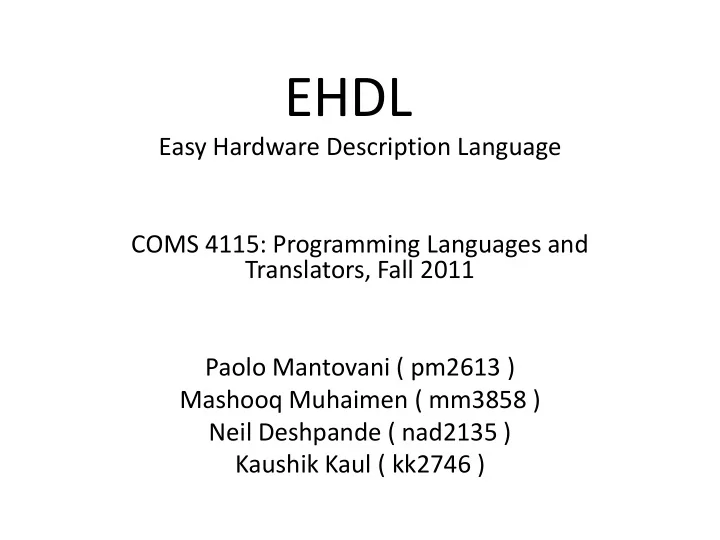

EHDL Easy Hardware Description Language COMS 4115: Programming Languages and Translators, Fall 2011 Paolo Mantovani ( pm2613 ) Mashooq Muhaimen ( mm3858 ) Neil Deshpande ( nad2135 ) Kaushik Kaul ( kk2746 )
Overview & Motivation • Why VHDL – Language in itself very verbose and low level – Becomes very complex as the complexity of digital system increases – Well understood problem domain • Goals of EHDL – Simple C like syntax, so flat learning curve – Succinct and straightforward, will help in increasing productivity of hardware engineers – Easy to grasp imperative style of coding
Tutorial • Start off – Nothing different from the ordinary – Open your favorite editor – Start off with the function main(). – Write EHDL code within this function. May also create your own functions. – Save the file with ‘. ehdl ’ extension – Call the Ehdl compiler on the target file • Data types: int, array • Operations – Arithmetic Operations – Logical Operations – Binary Operations – Unary Operations
Tutorial Four_to_one_mux.ehdl adder.ehdl int(8) z main (int(8) a, int(8) b, int(32) c main (int(32) a, int(32) b ) { int(8) c, int(8) d, int(2) sel ) { switch ( sel ) { c = a + b; } case 0: z = a; case 1: z = b; ./ehdl -o adder.vhd adder.ehdl case 2: z = c; default:z = d; } } ./ehdl -o adder.vhd adder.ehdl
POS (int(1) sum, int(1) carry) fulladder(int(1) a, int(1) b, int(1) carryin){ sum = a ^ b ^ carryin; carry = (a && b) ^ (carryin && (a ^ b)); } (int(4) s, int(1) overflow) main(int(4) a, int(4) b, int(1) carryin) { int(1) sum[4]; int(1) carry[4]; (sum[0], carry[0]) = fulladder(a(0),b(0),carryin); POS(1); (sum[1], carry[1]) = fulladder(a(1),b(1),carry[0]); POS(1); (sum[2], carry[2]) = fulladder(a(2),b(2),carry[1]); POS(1); (sum[3], carry[3]) = fulladder(a(3),b(3),carry[2]); POS(1); s(3) = sum[3]; s(2) = sum[2]; s(1) = sum[1]; s(0) = sum[0]; overflow = carry[3]; }
While Loop /* gcd */ /* primes */ Int(8) c main(int(8) a, int(8) b){ (int(32) primes=2) main (int(32) m) { int(1) a[200]; while (a != b) { int(1) sig; if (a > b) { int(32) n = 2; a = a - b; int(32) k = 2; } else{ while (n <= m) { b = b - a; if ((a[n] == 0) && (k <= m)) { } if (k == n) { primes = n; POS(1); } else { } a[k] = 1; } POS(a==b); k = k + n; c =a ; }else { n = n + 1; } k = n + 1; } } }
Trafficlight.ehdl const int(2) HG = 0; case FG: const int(2) HY = 1; hwGreen = 0;hwYellow = 0; const int(2) FG = 2; farmGreen = 1;farmYellow = 0; const int(2) FY = 3; const int(8) YDuration = 2; const int(8) FDuration = 3; fCntr = fCntr + 1; if ((car == 0) || ( fCntr == FDuration )) { state = FY; (int(1) hwGreen, int(1) hwYellow, int(1) farmGreen, int(1) farmYellow) yCntr = 1; main ( int(1) car ) { } int(2) state; int(8) yCntr; int(8) fCntr; case FY: hwGreen = 0; hwYellow = 0; state = HG; farmGreen = 0; farmYellow = 1; while (1) { switch ( state ) { yCntr = yCntr + 1; case HG: hwGreen = 1; hwYellow = 0; if ( yCntr == YDuration ) { farmGreen = 0; farmYellow = 0; state = HG; if ( car == 1 ) { } state = HY; yCntr = 1; } } } case HY: hwGreen = 0; hwYellow = 1; farmGreen = 0;farmYellow = 0; } yCntr = yCntr + 1; if ( yCntr == YDuration ) { state = FG; fCntr = 1; }
Compiler Architecture
Lessons Learned • Team-oriented development : complementary strengths • Interface-oriented design: Some instances where other teams members had to wait • Version control systems: SVN was a good productivity tool but we could have used more branches to cut the wait times • Test suite : Helped uncover a ton of bugs • Writing tests : Helped improve understanding of semantics • Code coverage : Again, helped catch bugs by forcing us to devise new test cases • Eclipse: is cranky
More lessons learnt • Same syntax – wildly different semantics • List.fold_left() • Ocaml has for loops !!!
Recommend
More recommend